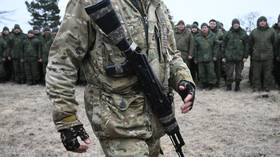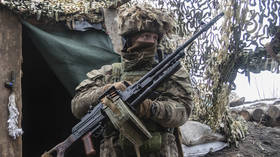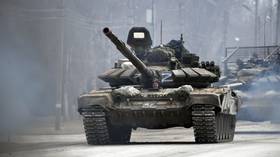Archive for the ‘Russia Today’ tag
‘We will never go back to Ukraine’
‘We will never go back to Ukraine’: DPR fighter jailed for his views by Kiev talks to RT

With the military operation taking place in Ukraine, some might ask – how will the locals react? Eight years ago, the general consensus was that the southern and eastern regions were pro-Russian, but then the Kiev regime started to brutally repress activists who wanted closer ties with Moscow. An aggressive war propaganda campaign was launched targeting Russia.
RT spoke about this with Vladislav Dolgoshey, an activist from Odessa who spent four years in jail after being charged with “pro-Russian subversive activities” without any proof. In 2019, he was released as part of a prisoner exchange. After this interview, Vladislav went to the frontline as a volunteer and joined the People’s Militia of the Donetsk People’s Republic.
— What was your path to your pro-Russian political views?
I wouldn’t call my political views pro-Russian, they are just Russian. You have pro-Russian views when your position on certain issues reflects that of Russia as a state. I consider myself Russian – ethnically, spiritually, nationally. Yes, I was born in a different country, foreign to Russia, but that’s just my circumstances.
My views were shaped by my surroundings. Odessa is still the most Russian city in Ukraine. The Russian language is absolutely predominant, and even Ukrainian nationalists complain that when a Ukrainian comes to Odessa, they start speaking Russian. And the residents are very protective of their Odessa identity. That facilitates assimilation.
My upbringing also played its part. My father was a pro-Russian politician, but, to his credit, he never imposed any of his views on me, just recommended reading books. I read books written by Ukrainian, Polish, and Russian historians.
— How did the Russian movement in Odessa react to the Euromaidan events?
The situation wasn’t great for us in 2014. President Yanukovych didn’t like the Russian movement very much, and this was his attitude to both nationalists and Orthodox activists. Despite this, more and more people joined our events every year. And these were very diverse groups – nationalists, Orthodox Christians, leftists, all united by one idea – their Russian identity.
Our reaction to the Euromaidan events was negative from the very beginning. First of all, we knew who was behind it. We understood which side Euromaidan turned to and knew for a fact that the West was not the political community we wanted to belong to.
We began to form militia units in February, but we were too late. Maidan had already happened, it had its hit squads and money. We acted fast, like in that saying about Russians taking their time to prepare for something but then moving fast. But we still were unprepared for what was to come. Russians are kind people. We had no idea something like the tragic events of May 2 could really happen. (Ukrainian nationalists murdered 50 pro-Russian demonstrators in the Trade Unions House during the protests. Vladimir Putin promised to find and punish the perpetrators in his 21st February speech — RT.)
The leaders kept saying that it was a peaceful protest, just people defending their rights and fighting for democracy. But once the West comes, there can be no democracy. All pro-Western revolutions were not about democracy – their goal was to create a corrupt system of colonial control. Democracy is something the West wants only for itself. And the West turned Ukraine into an unstable structure vulnerable to outside influence.
— What’s changed after the May 2 tragedy?
There were some legal political activities allowed by the Kiev regime. They were carried out by old people with Communist and religious views. But Ukrainian radicals had the nerve to attack even these grandmas and grandpas. Many healthy strong men went to the frontline, to the Donbass. Of course, not everybody made it. 100-150 inmates would be incarcerated in the Odessa jail at a time – these people were arrested as they tried to make their way to the Donbass.
There were also underground groups operating in Odessa and the Odessa Region. The indictment against me – and I would like to stress that the charges have never been proven – said that the allegedly sabotage unit under my command perpetrated terrorist attacks and sabotage activities across several regions in the southeast of Ukraine. The underground movement existed for around 18 months, engaged in this invisible struggle. Trust me when I say that 18 months is a really long time for an underground movement with no experience, no bases and no resources.
— Why have there been no tragedies comparable to the Odessa one in other cities across the southeastern part of the country?
You have to understand that Odessa was a stronghold of the pro-Russian sentiment in Ukraine. We’ve always been very vocal about it, and even now our people are not happy about the Ukrainian government. There are rumors that the current mayor of Odessa, Gennady Trukhanov, has a Russian passport and actually holds pro-Russian views. I don’t think these rumors are true, even though Trukhanov did make a speech at Kulikovo Pole Square not long before May 2 happened. So, in this period, between the Euromaidan winning and the tragedy, he was on our side. Then he made a U-turn, which is pretty typical of politicians.
Moreover, not many people know that they used force to crush pro-Russian movements in other Ukrainian cities as well. Take Zhitomir. Nothing like May 2 happened there, of course, but Zhitomir is not Odessa – it’s closer to the western part of the country. It was bad in Kharkov, and in Nikolayev they burned a makeshift camp. But it wasn’t on camera and the media didn’t cover it, though it was a real struggle, a street war and there were casualties.
To give you a better idea of what was happening, I can tell you that one Euromaidan supporter who later became part of the Azov Battalion (forbidden in the Russian Federation) claimed that even the war was less scary than Kharkov in 2014. You never knew what direction you could be hit from, you were always on the lookout for a sneak attack. It was the same in Odessa. We had a literal war in the streets, with cars and houses set on fire. People were being killed, some went missing. That was the civil war – it was back then.
— So why did the ideas of the ‘Russian Spring’ fail to triumph in most of the Ukrainian southeast in 2014?
They didn’t fail in 2014. The ‘Russian spring’ ended in 2015, after Minsk II. Until then, even though there were no military hostilities and no frontlines, hundreds and thousands of people were politically active and involved in the underground movement in Odessa and other places. It’s obvious if you look at the sheer number of political prisoners in Ukraine that were later swapped for POWs.

